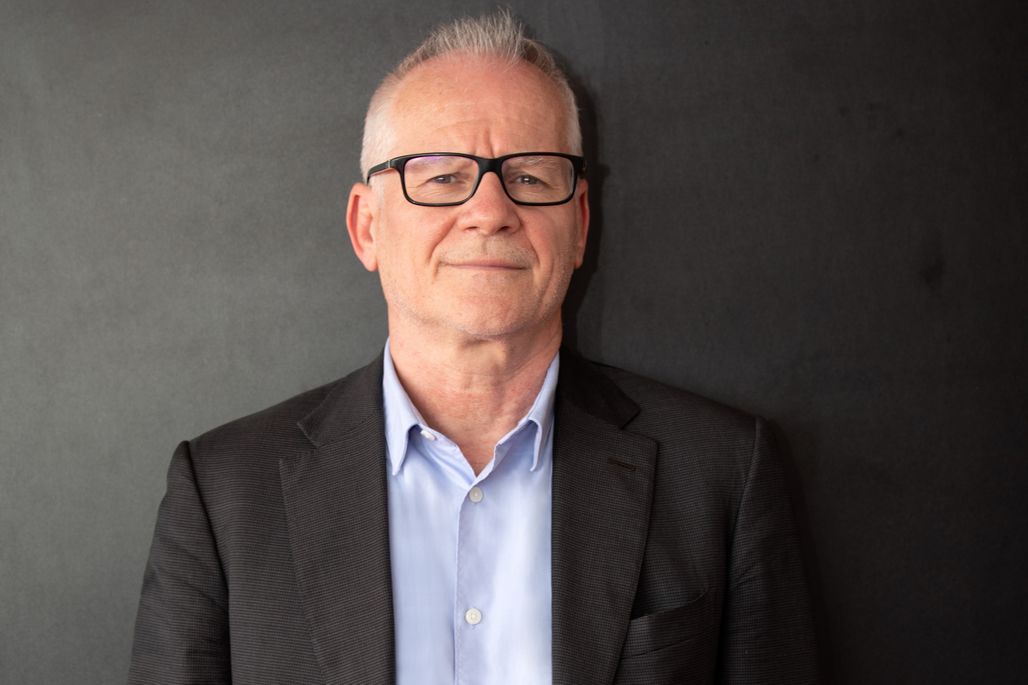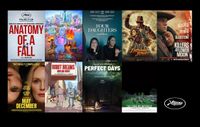
Cannes 2023 : Exclusive interview with Thierry Fremaux General Delegate for Variety.

Can the Cannes Film Festival top itself after a 2022 edition that premiered three picture nominees, “Top Gun: Maverick,” “Triangle of Sadness,” and “Elvis”? Cannes chief Thierry Frémaux certainly hopes so. In his first interview about the upcoming 76th edition, Fremaux tells Variety about his efforts to pull together another milestone edition, talks about his failed attempt to get a woman to preside over this year’s jury and his hopes to lure prestige U.S. indies, along with Hollywood studio movies, after proving once again last year that Cannes can be a strong launchpad for the awards season. But some things won’t change, as Netflix isn’t planning a return to the festival. Other streamers, like AppleTV+, however, are expected on the Croisette with Martin Scorsese’s movie “Killers of the Flower Moon.” On the sponsor side, Cannes will be working with TikTok while keeping a close eye on the social media site’s political ties. The Official Selection will be unveiled in mid-April in Paris.
A year ago, you were overwhelmed. How is it going this year?
I’m always overwhelmed around that time of the year! The selection process is in full gear and I’m lucky to have a wonderful team with Christian Jeune, head of the film department, and Stephanie Lamome who joined us as artistic advisor. For the last two years, we had to absorb a surplus of productions due to the lockdown, for movies that hadn’t been released in theaters. The festival wanted to open itself to more films to help them exist. That’s why in 2021 and 2022 the selection was larger. It was a choice. But in 2023, we would like to go back to a more traditional size in order to launch films in the best possible conditions.
How did you navigate the past three years of pandemic?
We’re very proud of how we weathered the pandemic. Cannes 2020 didn’t happen but we helped promote the films by giving them a “Cannes label”. This allowed us to measure the strength of our impact. We didn’t want to do anything virtual because a festival is a human gathering, and nothing can replace the “physical” reception of films, the roars, the reactions, the applause, and the journalists.
On this subject, I would like to salute the critics without whom Cannes would not be Cannes. First of all, the press gave a lot of support to the Festival over the last three years. Then, a healthy film criticism means a healthy filmmaking industry. It is the critics who keep the standards high. We stand by them, we want to welcome them better, to improve the work of press attachés for example. We are considering having an area reserved for interviews in the Palais des Festivals.
Films need to be seen on the big screen and discovered together. During the lockdown, we remained close to producers and filmmakers. In 2021, the Festival finally took place in July and I think it’s a wonderful memory for everyone!
Last year, 2022, was a great Festival, thanks to the films, the “Marché” and the general atmosphere. Because we all came together again, we were back in “our” Cannes, sustained by the collective belief in the importance of a festival. Back were the tourists, strolling on the Croisette. And the Majestic, the Martinez, the Grand Hotel and especially the Carlton with a sumptuous makeover, were fully renovated.
So Cannes is not planning on expanding its selection further?
The number of films in competition or with Un Certain Regard is the same. In 2021 and 2022, there were more special screenings and documentaries, but we will cut back on such programming. Some have claimed that Cannes wants to take everything and leave less to other film festivals. This is ridiculous. We respect the three seasons: winter with Berlin, Sundance and Rotterdam; spring with Cannes; autumn with Telluride, Venice, Toronto and San Sebastian. They are important. Cannes works in perfect harmony with San Sebastian, Telluride and Toronto, where films presented in Cannes in May may be selected.
What is your relationship with Venice?
I hear that Alberto Barbera travels to the U.S. earlier and earlier in the year…
I have a long-standing friendship with Alberto Barbera and Roberto Ciccuto and it is well known that Cannes and Venice have well-established historical ties. The competition situations have always existed, especially since Venice is ideally placed on the calendar at the beginning of the fall.
Cannes Première was very successful, are you going to keep this section?
Cannes Première is a success and shows that festival can still evolve. It’s a “mini-section” which allows us to show movies from established filmmakers outside of the competition and to provide them with a spectacular launchpad. Movies like “The Night of the 12” by Dominik Moll and “As Bestas” by Rodrigo Sorogoyen greatly benefited from it. And these films are screened at the Debussy theater, which was the favorite of Jean-Luc Godard — whose name I’m happy to mention. The experience was positive and will be continued.
What about Un Certain Regard?
More than ever, Un Certain Regard is a section dedicated to young, original and experimental cinema. It’s meant to be about discoveries and emerging filmmakers. The selection of 2022 was a great harvest. We presented the films of 11 female directors and 11 male directors and some of them earned great reviews and resonated internationally, for instance “War Pony” from Riley Keough and Gina Gammell which received the Golden Camera, “Plan 75” from the Japanese director Chie Hayakawa, “Les pires” (“The worst ones”) by Lise Akoka and Romane Gueret, and “Joyland,” the first film of Pakistani director Saim Sadiq about trans identity which was banned in its home country but was shortlisted at the Oscars, along with (other Un Certain Regard titles) “The Blue Caftan” from the Moroccan director Maryam Touzani and “Mediterranean Fever” from the Palestinian director Maha Haj, to name a few examples.
A far cry from the regulars…
There are no regulars in Cannes and the Festival has always supported young creators. A selection needs creative vitality, fuelled by the points of view of all generations. All initiatives aimed at supporting and guiding young filmmakers have been brought together under one banner, that of “Cinéma de Demain”: the Short Film Competition, the Camera d’Or, the Cinefondation selection of film school productions, the Writing Residency and the “3 Days in Cannes” program, which allows young film lovers from all over the world to experience the Festival de Cannes. This is one of the innovations I am most proud of.
How was it to travel again this year, especially to Asia? Did it make the selection process more enjoyable?
In that respect, our jobs have changed. We travel not to see films, which circulate more easily thanks to digital technology, but to meet artists and professionals in their homelands, in Asia, Latin America, Africa, or other European countries. And of course the United States. To see people where they live, where they work.
The Festival de Cannes always insists on its universalist vocation.
Yes, Cannes is not a French festival, it is an international festival in France. For two weeks, it is a protected global territory that places cinema at the heart of the world. I am happy to keep up this tradition when we see, after Asia, the emergence of a new North African cinema spanning from Egypt to Morocco, with a generation that includes many talented women directors. The emergence, also, of a sub-Saharan, black African cinema, of which Mati Diop’s “Atlantic” was the emblem by winning the Grand Prix.
In Cannes, we really see films from all over the world.
Cinema tells the history of the world, and Cannes must tell the history of everyone, and not just that of the occidental world, as it was the case 50 years ago. In the past, Asian cinema was summed up by Japan and since the start of the 2000s, Korea, Singapore, Thailand and China have emerged. In Eastern Europe, it was all about Poland for a long time (wonderful memory of Skolimowski last year), and it’s now Hungary’s turn, and Romania, with the emerging of a formidable new generation. Northern Europe also has something to say, and how so! With Ruben Ostlund and Joachim Trier, and the Danish, the Icelandic directors. Cannes is the theater of this greater universality, even beyond the competition because these films are also selected for Un Certain Regard and in the short films, at the Cinef, etc.
Has world cinema changed?
It’s growing ! And we should not forget Spanish, Mexican, English, German and Italian cinema. We hear that Italian cinema is chasing its past glory but I think its contemporary glory is wonderful! Take for example Alice Rohrwacher who presented “The Wonders” and “Happy as Lazzaro” in competition and came back last year with the short film “Le Pupille” which was nominated for an Oscar after opening in Cannes.
Things are also happening in the Gulf Peninsula.
And as we noticed a few years ago in Lebanon, Palestine and Israel, there is a new generation of professionals and artists in the Persian gulf. In Dubai, Qatar, Abu Dhabi, as well as in Saudi Arabia. We should get ready to salute the coming of age of this region.
What do you think of Saudi Arabia hosting the Red Sea Festival?
I went there and met some dynamic young people. Saudi Arabia is a country of 35 million people which promotes local filmmaking and wants to produce films and allow artists to emerge. We should salute this. Of course, there are geo-political considerations. But Saudi Arabia evolves, especially when it comes to women’s place in society. It progresses, probably not fast enough from our Occidental standpoint but when we see what’s happening in Iran and Afghanistan, we have to look at this evolution in a positive light.
In short, the more filmmaking goes everywhere, the happier we should be.
What do you think about Qatar financing Maïwenn’s film? Can we imagine that Qatar will play a bigger role in financing French cinema?
I don’t know. Qatar finances the Paris football club, so maybe they want to do the same with French cinema? We should ask them. Cinema is an elusive object and we must respect its uncertainty, fragility and magic. Pouring tons of money has never made movies better. To make movies exist, we need artists and professionals first and foremost.
And freedom of expression…
Indeed. Even the Hollywood studios, whose vocation is to generate profit, have always respected this immutable rule. Let’s hope that the movies from the great American auteurs will find back their audiences in the U.S., that the public will once again enjoy the great and beautiful stories for grown ups. We’re happy to see that these films are working well in France. I think our country was the best international territory for Damien Chazelle’s “Babylon” and Steven Spielberg’s wonderful film “The Fabelmans” is thriving over here.
It may be thanks to the great come-back of American movies that the French box office recovered.
The month of June 2022 is comparable to the month of June 2019. How? Thanks to “Top Gun: Maverick”, “Elvis” and “Jurassic World Dominion”. So yes, the financial fate of world cinema depends a lot on these movies. It is a rule, which is also the rule of Cannes: the big films protect the small ones.
In France, the market share of American films may be less than in other countries, but in absolute terms it is more because our market remains very high. The studios have a grasp on this particular position of France.
Is this partly why U.S. studios are coming back to Cannes?
The friendship between France and Hollywood is historic. Studios have always liked coming to the Cannes Film Festival. It was founded in 1939 and organized in 1946 (after WW2) by France and the United States. 2023 will prove once again the strength of this bond, I’m sure of it! America remains an extraordinary country for filmmaking and it is nice to see that, after the times we went through, things are happening again. And the renewed fondness for movie theaters is precious – no one wants them to disappear and studios know they’re essential. In order for their streaming platform films to exist and stand out, the studios need to be strong, and for this, nothing beats the cinema, the critics, the public, and the box office.
When it comes to American auteur films, they prefer to be released at the end of the year to be closer to the Oscars season. But I must say it again: We can be born in May at Cannes and still be alive in March at the Dolby Theater ! We prove it each year.
This year was a milestone in terms of Cannes movies at the Oscars. Did you feel that studios were more receptive when you met them recently?
Yes, it’s wonderful to see “Top Gun: Maverick” and “Elvis” celebrated at the Oscars as in Cannes. I’ve always been warmly greeted by studios because of what the festival represents for cinema and also because it champions the big screen. I also have very good relationships on a personal level with the heads of platforms. We invited Netflix back in 2017 and way before, we had invited Ted Sarandos for a panel at the Cannes Marché du Film. In 2016, Amazon attended with films by Jim Jarmusch, Park Chan-wook and Woody Allen. HBO and Apple have also presented films in the official selection.
Are you in talks with Apple about Martin Scorsese’s « Killers of the Flower Moon » ?
Yes, we are. And with Paramount.
Apple has a deal with Paramount that should allow the film to be distributed internationally. Will this be the case in France, if it is shown in Cannes?
This year, the important thing is to make sure that Martin Scorsese attends with his new film which is an important work. The last time he came with a film was for “After Hours” in 1986! Our rule is that a film in competition must be distributed in French theaters. If it is not, the Festival can welcome it out of competition, like “Top Gun: Maverick” and “Elvis” last year, which had a triumphant Festival.
Will Netflix return to Cannes?
Netflix films are welcome. Since they don’t come out in theaters they can premiere out of competition. Netflix is a big success story and a home for many film professionals; their movies would be welcomed triumphantly and benefit from a wonderful launchpad thanks to the festival. I’d like to convince them to come, to not stand aside. But I know they wish to be in competition – Ted [Sarandos] has a competitive spirit!
Your rule must change at some point, right?
The world is changing, but Cannes is a film festival that defends theaters. But the arrival of platforms and their contribution to the creative world is as important on a global scale. French windowing rules are already evolving and will continue to do so. The administration board of the Cannes Film Festival dedicates a lot of time to this issue. We discuss Netflix very often, and these are always enriching debates.
We could also slightly relax the rules and grant films in competition in Cannes financed by streaming platforms a four-month window, exceptionally.
I’ll let you make the proposal to the CNC and French professionals!
So Netflix will continue to go to Venice…
It’s clear that the Mostra profits from Netflix movies. But we don’t have the same culture or recent history. At Cannes, we make it mandatory for the opening night movie to be released the same day in theaters, whereas at Venice last year, the opening night slot was reserved for a (streaming) platform. That would be inconcevable in France.
With Vincent Lindon in 2022 and Ruben Ostlund this year, it seems clear that Cannes doesn’t give in to the hype of having stars presiding over the jury. How do you assemble a jury?
Stars and auteurs aren’t incompatible. Cate Blanchett proved it recently by being a magnificent jury president. The presence of Ruben Ostlund who won the Palme d’Or twice is the guarantee that we’re going to speak about cinema.
And not politics…
The Festival has always been political, through the films it shows. Talking about politics should be reserved for artists. Ken Loach talked about the evils of liberalism. Andrzej Wajda presented “Man of Iron” six months after Jaruzelski’s coup and won the Palme d’Or. Spike Lee, an extraordinary director, an irresistible and committed personality, was the first black president of the jury of a major film festival. He was there foremost to talk about cinema, as shown by his Palme d’Or for Julia Ducournau’s “Titanium”. Vincent Lindon is almost a political figure in France. And the way Ruben Ostlund sees the world says a lot about his commitment. Cate Blanchett presided with Agnès Varda over an extraordinary number of women being recognized. But all came primarily for the cinema.
And the rest of the jury, how will you achieve a balance?
We’d like to reaffirm the fact that cinema isn’t just filmmakers and actors, but also crew members, musicians, screenwriters and producers. But it is increasingly difficult to assemble juries.
Why is that?
Everyone works a lot! When you’re a director you’re making a film for theaters or for a platform. You make a series, you produce a documentary. When you’re an actor, you make films and series. Same with crew members. And when people have one or two weeks of break, they stay home with the kids.
Is it important to have stars in Cannes?
Absolutely. From the beginning, the Festival has embodied glamor, the red carpet, stars, the media, it is one of the ingredients that must be guaranteed. Which we did with Tom Cruise and Paramount last year, with Joseph Kosinski and Christopher McQuarrie (by the way, two great filmmakers). It’s Forest Whitaker receiving an honorary Palme d’Or, it’s Julia Roberts taking the stage and handing the Chopard Prize to young actors, and Virginie Efira as Master of Ceremonies.
There’s also yet another man presiding over the jury. Did you try to have a female jury president?
These past few years there’s been more women presiding over the jury. And there is parity in the competition jury. But to answer your question very concretely for 2023, we had a beautiful list of potential female jury presidents and none were available.
In competition, there’s been slightly more female directors in recent years but never more than five. Can we expect to see more in 2023?
I also hope there will be more. The place of women in film is progressing indeniably. The selections and nominations must reflect this progression more strongly. At the same time, we don’t say enough that in 2021, female directors won Cannes, Berlin, Venice and San Sebastian. It was first time in history. That same year in 2021, in Cannes, female directors won all the prizes: Palme d’Or, short film, Golden Camera, Golden Eye for best documentary, Cinef, etc. We must cheer up about the evolution of things, not just throw our hands up as if nothing was ever changing. Because things are changing.
Will Cannes screen movies from filmmakers who are considered “canceled” such as Roman Polanski or Woody Allen? Both men have new films.
I don’t think Roman Polanski’s film is ready for Cannes. Maybe Woody Allen’s will be. We will position ourselves depending on the situation.
We heard that HBO’s series “The Idol” was going to premiere at Cannes?
We show “filmmakers’ series” when they are by Jane Campion, David Lynch, Olivier Assayas, Nicolas Winding Refn or Marco Bellocchio, or with actors we are celebrating. This must remain limited.
What about “The Idol”?
I’ve only seen one episode. It seemed promising.
What about the latest Indiana Jones?
I saw it, the film is wonderful. We would be delighted to show it at Cannes.
And Disney Pixar? There used to be a tradition of showing a great animated film every year. Will this be the case in 2023?
Yes, I would like it to be the case again. I was recently received very warmly by Disney, Pixar, Searchlight in Los Angeles. We all have very fond memories of “UP” opening the Festival. Experimentation has always made festivals evolve.
There are rumors of Pedro Almodovar’s short opening the Festival.
It’s a short film, I believe, so no, not on opening night. It’s a rumor, but I like rumors, they’re part of the Cannes mythology.
The war is still raging in Ukraine. Will you invite Volodymyr Zelensky to make a speech on opening night like you did last year?
This war of aggression must stop in the first place. I’ll say it on a personal level and I’m not the only one. Last year, we felt the urge to express our solidarity with Ukraine and our political opposition to the war, and to Russia’s hawkish attitude. President Zelensky made a very beautiful speech, a cinephile’s speech. We wanted to invite him also because he’s a comedian, someone who comes from our world. The engagement of artists has also been sacred for the film world in general and for France in particular. We were proud to give him this time to speak. We must continue to express our support. Especially since Ukraine has always been a big country of cinema with a young generation that expresses, through films, its fierce willingness to defend their country’s independence.
Were there many political films in the entries this year?
Yes, many different sorts. Filmmakers express a vision of the world. The selection is in progress, it is not final.
Are you an optimist?
I’m always optimistic, even if I sometimes have the feeling that the two basic pillars, mainstream films and auteur films, are moving away from each other. We must bring them closer again. In France, we are returning to box-office levels of 2019, before the pandemic. From now on, we must be concerned about the future, educate young people who have other ways of consuming pictures about going to the movie theaters and make them understand that the future of cinema is also their responsibility. That it is an unforgettable and founding experience, as shown in Tarantino’s wonderful book, “Cinema Speculation”.
What did you think of the Oscars this year?
I thought the ceremony was very good and I was happy to see Michelle Yeoh rewarded (and disappointed that Steven Spielberg wasn’t, because his film is a love letter to cinema). I don’t understand either why “Triangle of Sadness” can’t vie for a best international film Oscar, even if it’s in English. How can a non-American film win the Oscar for best film since it’s a ceremony in honor of American cinema? “Parasite” won, it’s great, but it’s a Korean film. The Oscar for best film must go to an American film, like the Cesar for the best film goes to a French film and the Goya goes to a Spanish film.
But the fact that these films can compete for the Oscar for best film is seen as progress.
What sort of progress?
TikTok is one of your sponsors since last year. Are you continuing with them?
We partnered with TikTok for the first time in 2022 to address younger and more international audiences. In France, TikTok has collaborated with the best cultural institutions, working with the Louvre Museum, the Château de Versailles and now with Cannes. We’re happy to contribute to making the festival more accessible to younger people. And numbers are really impressive. We also know that TikTok raises a lot of questions from governments because it’s a Chinese firm. When it comes to us, we’re looking at how creators are remunerated and TikTok is reassuring us on their intentions. So we’re happy about the results of this partnership and the human relationship we have forged with them, but we are, along with the new President Iris Knobloch, mindful that the engagements that TikTok has taken must be respected.
How are things going with Iris Knobloch?
The transfer of power from Pierre Lescure went smoothly, just as he and the Minister of Culture intended. From the outset, Iris has been a strong President with a great presence. She protects employees and immediately knew how to work with both public and union Board members, with the supervisory authorities but also with private partners and sponsors. She leads the Board of Directors with authority and competence. She feeds the debate on all subjects of importance for the Festival. She and I work hand in hand. When she worked at Warner, where she was loyal to Cannes, she was on the other side. She is eager to live the Festival from the inside.



